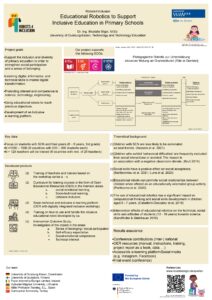The term “educational robotics” refers to a field of study that aims to improve student’s learning experiences through the creation and implementation of activities, technologies, and artifacts related to robots” (Angel-Fernandez and Vincze, 2018)
The aim of the project is to investigate how interaction with educational robots can promote and support learning processes of technology, programming and socio-emotional skills in children. Our target group is 8- to 9-year-olds, in primary education, focusing on inclusive classes for all children.
The fusion of inclusion and digital skills are becoming key elements of our time in an increasingly digitalized world. We work closely with our European partners to make a significant contribution to inclusive education. Our focus is particularly on primary education, where we want to emphasize social participation, the strengthening of children’s self-concept and the promotion of IT and technical skills. In this way, we would like to help prepare young people for the challenges of an increasingly digitalised world. The idea of our project is to integrate self-built educational robots into social activities.
Our project aims to include self-built educational robots in social activities designed to promote social interaction and diversity in primary education, at the same time, encourage informatics and technology skills, mastering the digital transformation by developing digital and promoting interest and competence in science, technology and engineering.
As part of the robotics project, we teach the participating children to understand and apply simple principles of informatics and technology. Our intention is indeed for them to use their skills to solve real-life problems. Furthermore, we want to strengthen cooperation and show young people what potential they have.
The project is co-financed by the Erasmus + Programme of the European Union and it is implemented, between 3 years (01.01.2024 – 01.01.2027), being a Cooperation partnership in higher education (KA220-HED). It is a transnational consortium led by University of Duisburg-Essen (Germany), which includes partners from five others countries: University of Jyväskylä (Finland), Foyle Internship Europe Limited (Ireland), Vytautas Magnus University (Lithuania), M&M Profuture Training, S.L. (Spain) and Dumlupınar University (Turkey).
More information:
Dr. -Ing. Mustafa Bilgin, M.Ed.
– Akademischer Rat – Universität Duisburg-Essen - Fakultät für Ingenieurwissenschaften
Technologie und Didaktik der Technik

